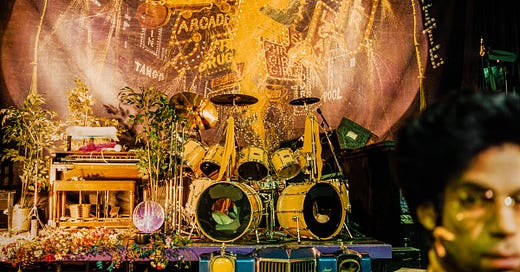After the release of 1986’s Parade, the recording of Prince’s next album was complicated by the dissolution of his backing band, The Revolution. Over this period, we have been denied the release of Camile - which looks set to appear later in 2022, an album with Prince experimenting with pitch-shifting his vocals. There was also Dream Factory, which hit the buffers in October 1986 after The Revolution’s end. Finally, there was the material for the ultra-ambitious triple-album Crystal Ball. That album’s purported track list has ‘Adore’ as the final cut,1 and much of it ended up on Prince’s magnum opus, the double album, Sign O’ The Times. Rather than as he had lost his backing band, the material was trimmed, allegedly, as his label was concerned about declining album sales and six sides of vinyl became four.
While they weren’t a going concern, they were still in the picture - this song is reportedly about Susannah Melvoin, twin sister of guitarist Wendy Melvoin. Since Purple Rain, Prince had put forward Susannah as the lead singer of his side project, The Family, as well as joining the extended version of The Revolution. At one point, they were engaged and ‘Adore’ seems to reflect the depths of these feelings.
‘Adore’ wasn’t the first Prince song to be focused on nocturnal activities that upset the FCC. In a Prince way, it is far more wholesome than those found in ‘Darling Nikki’, ‘Do Me Baby’, ‘Let's Pretend We're Married’, ‘International Lover’ and ‘Head’. Some regard it as Prince’s best ballad; musically, it is away from the hard funk and psychedelic rock in some of those songs. The lyrics are also set apart; it is a more mature view of love as something deeper and more spiritual, a tightrope which he would explore even further on 1988’s Lovesexy as opposed to the more animalistic tone of earlier songs. Prince is even suggesting giving up all of his possessions as a gesture - except the ride, and he sounds like a pastor preaching amongst the horn section, arranged by Atlanta Bliss and Eric Leeds.
To illustrate this depth of feeling and how it is emotional progress, he calls back to ‘I Wanna Be Your Lover’, wanting to be more than a mother, more than a brother. There’s also a reference to another song about Susannah Melvoin, ‘Nothing Compares 2 U’, with the nothing can compare line and another Prince singing about things being crucial - a piece of this name would emerge on the Super Deluxe version of the album released in 2020.
In his 33 ⅓ book on the album Michaelangelo Matos says he means it ;
every last fucking dappled, gold-embossed, spangled, dewy-eyed, iridescent, opalescent (that’s right, this song emanates light and diffracts it), incense-permeated, sweet-time-talking, defenses-breaking, manifest-destiny-love-sweet-love second of it.
It would have been perfectly sensible scheduling of the album to put a live track last as he did on Purple Rain.
Instead, there is a switch and we get the dissipating crowd noise from “It’s Gonna Be a Beautiful Night” as our segue into the song.
In some ways, ‘Adore’ can be considered a song for fans who were concerned that Prince had turned his back on them. There was criticism that he had moved away from his black roots in the MTV era and that this was him throwing a bone for them. I’m not sure if that was his intention but if it was, it worked. The song was never released as a single but got a lot of airplay throughout 1987 on R&B radio and probably rivals the five released singles for combined airplay since release.
It references landmark soul albums by Al Green like Let’s Stay Together or even Marvin Gaye’s What’s Goin’ On with the organs, the horns and the gospel feel. In 1993 Prince wrote in the liner notes for The Hits/The B-Sides2 compilation that Luther Vandross and Patti LaBelle were sources of inspiration. You can also detect a torch that passes down from acts like The Stylistics and The Chi-Lites as well. Along with the balance between lust and love he’s also balancing the scales between the sacred and the profane by putting this type of backing to those lyrics.
The song has continued to have a distinguished legacy. According to setlist.fm it is the 21st most played song by Prince, with heavy play in 1997 and 2005. More than that is it’s influence on some of Prince’s fans; it’s been voted as high as #2 on lists of Prince’s best songs and one of the best R&B songs ever. A lot of contemporary R&B and smooth soul from the early 1990s right through to the likes of Usher, who has openly spoken of his love of ‘Adore’, to Frank Ocean and Ariana Grande sounds like it.
Maybe love isn’t quite the word we are looking for when talking about the depth of feeling for this song either and Prince has the right idea when electing for adore.
Next week: Miles Davis and Television
The song’s inclusion in the compilation is another reason for its continued popularity, giving it a further sense of importance even among Prince’s smash hit singles of the preceding 15 years.





